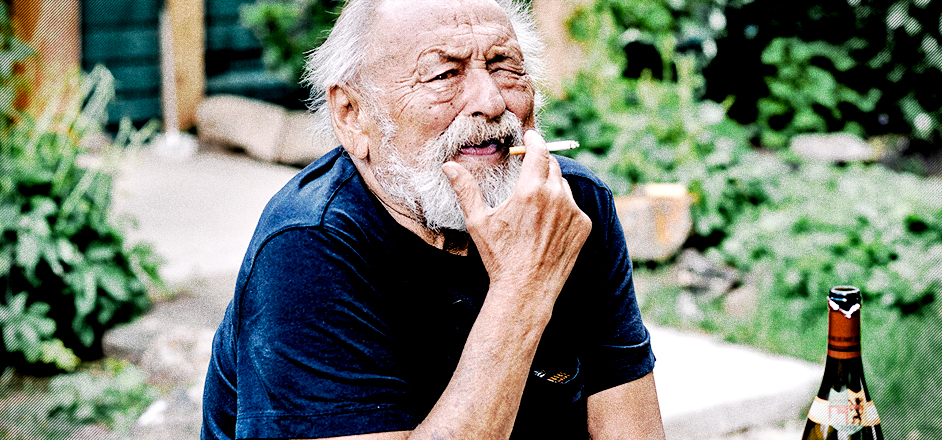We lost a champion, but his words will always be with us.
Maybe you've never heard of Jim Harrison; he's the prolific author responsible for hundreds of killer articles, books and short pieces, including this little gem:

And like most artists, he hit the booze pretty hard, claiming to put frat boys to shame by crushing half-gallons of vodka. Thankfully, he reeled it in and avoided death by drowning by following his own set of rules about moderation.
“It all began with a few stolen sips,” Harrison wrote in a piece titled “A Man's Guide to Drinking" in the October 2001 issue of Men's Journal. “The first time I got drunk was at seven in the evening on a New Year’s Eve. My mother made me get in a hot bath, where I vomited my thirteen-year-old heart out.
"In my forties, I turned to wine with a passion," he continues. "I tested thirty-four Côtes du Rhones in search of a house wine I could afford … I could have become a wine snob, but didn’t. The escape was narrow, but my salvation was several near-bankruptcies …. I will not be stopping on the way home from the office for one of the syrupy California 'cabs' so favored by nitwits …. Money can distort the buying and drinking of wine just as it distorts art in the gallery and auction businesses.”
So whether you're a 21-year-old bro brah or a crusty old grandpa, Harrison's rules for drinking are a damn good set to follow.
Jim Harrison's Principles of Moderation
"Quite some time ago I turned a corner with the emotion of wanting more consciousness. The following list had a wondrous, albeit slowly evolving, effect on my life. These are relatively mild pointers, though the consequences of ignoring them are as fatal as shooting yourself in the head in a curious time warp wherein the bullet takes many years to reach its inevitable target." -Jim Harrison
1. Drinking causes drinking. Heavy drinking causes heavy drinking. Light drinking causes light drinking.
2. The ability to check yourself moment by moment has been discussed at length by wise folks from the old Ch’an master of China all the way down to Ouspensky. This assumes a willingness to be conscious.
3. The reason to moderate is to avoid having to quit, thus losing a pleasure that’s been with us forever.
4. We don’t have much freedom in this life, and it is self-cruelty to surrender a piece of what we have because we can’t control our craving.
5. Measurement is all. A one-ounce shot delivers all the benefits of a three-ounce shot. A couple of the latter turn one into a spit-dribbler. Spit-dribblers fighten children and make everyone else nervous.
6. With any sedative there is a specific, roomy gap between smoothing-out and self-destruction. There is no self-destructiveness without the destruction of others. We are not alone.
7. Naturally there are special occasions. When you get older like me, it’s once a month, if that.
8. It’s hard to determine pathology in a society in which everything is pathological. The main content of our prayers should be for simple consciousness. The most important thing we can do is to find out what ails us and fix it. Often we need outside counsel, for clarity and to speed up the process. (I’ve had more than twenty years with my mind doctor).
9. A lot of overdrinking comes from feeling bad physically. One over-drinks to feel better in physiological terms. This can be avoided by vitamins, exercise, and a reasonable diet. Again, it’s a cycle: Overdrinking causes overdrinking because you feel bad.
10. Another source of the problem is the unreasonable expectations we get from others and ourselves. Unreasonable expectations can be removed by thinking them over. They can’t be “drownt” pure and simple. Everyone can’t get to the top, or even the middle.
11. Oddly enough, our main weapons in controlling drinking are humor and lightness. The judgment of others and self-judgment (stern) are both contraindicated. When we fuck up, we mentally beat ourselves up. It doesn’t work at all and has to be expunged. The reason to slow down is to feel better, and it works real good.
12.You begin by cutting it all by a third. After a few weeks you go down to a half. After that your soul will tell you, when you listen. Often it is simply a matter of one drink too many.
13. We need always to separate the problem of virtue from the problem of lack of control. Certain countries—France, for example—drink more alcohol but have fewer problems. This is partly due to the predominance of wine, which has less of a stun-gun effect on behavior, but also because drinking isn’t connected to virtue or nonvirtue. It is a practical problem. Drinking has to be strictly self-controlled the moment it negatively affects our character and behavior.
He died last year of a heart attack, but he won't be forgotten.



Leave a Reply
You must be logged in to post a comment.